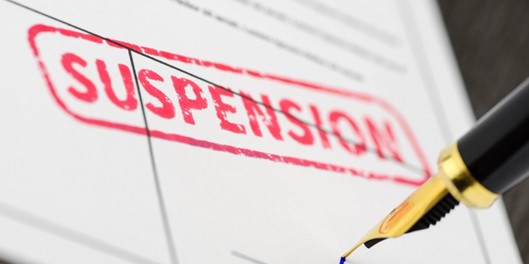ACAS has published new guidance to employers on how to consider and handle staff suspensions, specifically during investigations.
When misconduct is alleged and, as an employer, you need to find out what has happened, you may decide to suspend one or more employees pending the outcome of the investigation.
The main legal risk for you is that the employee may claim that you have breached the implied duty of mutual trust and confidence and therefore the contract of employment, entitling the employee to bring a claim for damages.
One of the key cases in this area made it clear that suspension is not automatically justified merely because there is evidence that would support an investigation. Suspension should not be a knee-jerk reaction, for the reasons set out above. The court has emphasised the practical consequences for an employee of a suspension: they may feel belittled and demoralised by being excluded from work and colleagues, and this can be psychologically damaging. Even if the employee is later cleared of the charges, suspicion is likely to linger, particularly as the suspension might seem to add credibility to the charges.
This is not to say that suspension is never justified. The High Court found in one case that there had been no breakdown of trust and confidence where an investigation took place which was lengthy, but not inordinately or disproportionately so.
The ACAS Code of Practice on Disciplinary and Grievance Procedures states that where suspension is considered necessary, the period of suspension should be as short as possible and be kept under review. In addition, you should make it clear that the suspension is not considered a punishment.
The courts accept that suspension is permitted, however, it is for you to demonstrate that you properly considered whether suspension was justified in the particular circumstances.
To help employers, ACAS has published new guidance to advise on how to consider and handle suspensions at work, specifically during investigations. The guidance covers deciding whether to suspend someone, the process for suspending someone, supporting an employee’s mental health during suspension and pay and holiday during suspension.
An employee should receive full pay during any period of suspension, unless there is a clear contractual right to suspend without pay. However, given that the investigation should not be predetermined, any suspension should be on full pay pending the outcome of the investigation.
ACAS recommends that, because of the risk of breaching the employment contract and the stress that can be caused, a suspension should only be used when it is a reasonable way of dealing with the situation (for example, while an investigation is carried out and there is a need to protect evidence, witnesses, the business, other staff or the person being investigated) and there are no appropriate alternatives.
You should consider each scenario very carefully, based on the specific facts of the case, before deciding whether to suspend someone or not.
Suggested alternatives to suspension include, but are not limited to:
- Allowing employees to continue in their usual role where this is compatible with the investigation.
- Changing shifts, location or allowing the employee to work from home.
- Letting the employee work with different customers, or away from customers.
- Assigning the employee with a different project or case load, in a separate are to the investigation.
- Temporarily changing who the employee reports to, pending the outcome of the investigation.
- Stop the employee from working with certain systems, tools or on specific tasks but allowing them to continue working.
A suspension may also be appropriate in order to protect the employee’s health and safety (such as in medical or pregnancy circumstances) and this should be considered, based on the specific situation at hand.
You should also support a suspended employee by explaining the reason for the suspension, emphasising that it does not mean that it has been decided they have done anything wrong, maintaining pay and benefits, keeping the suspension as short as possible, keeping it confidential wherever possible, and staying in regular contact throughout the period of suspension.
The employee should be informed of their suspension in person if possible. It is good practice to allow an employee to be accompanied at any suspension meeting, but not a legal requirement, and for the suspension to be confirmed in writing.
Further, as the employer, you should mitigate any damage and should:
- Consider what you will say to the suspended employees colleagues or clients. If possible, this should be agreed with the employee in advance and should seek to be neutral. You should try to have one point of contact within the business for addressing any questions about the suspension so that the messages remain consistent.
- Make the period of suspension as brief as possible, including by lining up the investigation team and arranging any witness interviews swiftly.
- Ensure that the employee remains informed by receiving regular updates from you.
- Keep the suspension under review, considering at regular points during the investigation whether the original reasons for suspension still apply; for example, if you suspended the employee to ensure that documents were not tampered with, but you are now confident that you have gathered all relevant documentary evidence, the employee may be able to return to work.
It is important to note that the ACAS guidance is just that, guidance and not law. Legal advice should always be sought before any decision to suspend is made in order that the specific situation can be analysed and advised on correctly.
Reach out to us and we can help you get suspending a worker right!
? hello@peachlaw.co.uk
? Connect with us on LinkedIn – Peach Law (HR & Employment Law Specialists)
? 0161 478 2800


